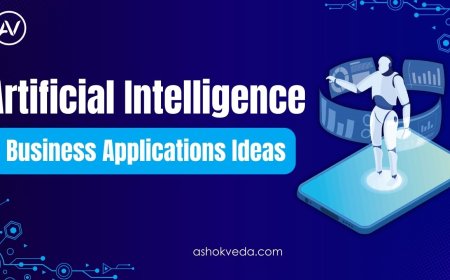How to Choose the Best AI Career Options
Explore AI career options and learn how to choose the best path in artificial intelligence. Find insights on job roles, skills, and growth opportunities.

Hey, there! If you're reading this, you're probably interested in the exciting field of AI and the career options it provides. Whether you're just starting or looking to change careers, the field of Artificial Intelligence has a lot of interesting opportunities. But with so many options, where do you begin? Let's look at How to Choose the Best AI Career Options for employment based on your interests and talents. We'll look at roles in Machine Learning, Data Science, and more to take and how to position yourself for success in the world of AI.
Understanding AI Career Options
Artificial intelligence is transforming the world as we know it, from automating everyday tasks to managing complicated issues in new ways. When reviewing AI career options, it's important to understand the many different positions available in this quickly changing industry. There are a few popular AI employment paths, including:
High-Demand AI Career Paths
1. Machine Learning Engineer
Machine learning engineers are at the forefront of AI development, creating algorithms that allow machines to learn from data. This position requires good experience in mathematics, programming, and data analysis. As a Machine Learning Engineer, you'll work with huge datasets, create predictive models, and implement machine learning systems. Key abilities include fluency in programming languages such as Python and experience with frameworks like TensorFlow and PyTorch.
2. Data scientist
Data scientists analyze large databases to find patterns and insights. They use methods from statistics, Machine Learning, and data visualization techniques to assist enterprises in making decisions based on data. This post requires proficiency in programming languages such as Python or R, as well as a strong foundation in statistics and machine learning.
3. AI Research Scientist
This position requires advanced studies to develop new AI technologies. AI research scientists frequently work in academic institutions or research labs, pushing the limits of what is possible with AI. This position normally requires a Ph.D. in a comparable discipline, as well as research and publication experience.
4. AI Software Developer
AI software developers develop applications and systems that use AI technology. This position demands software engineering ability as well as a solid understanding of AI principles. Knowledge of AI libraries and frameworks, such as Scikit-learn and Keras, is beneficial.
5. Robotic Engineer
Robotics engineers design and build intelligent robots. This career integrates knowledge of artificial intelligence, mechanical engineering, and computer science. Key areas of focus include AI-driven automation, human-robot interaction, and the development of autonomous vehicles and drones.
6. AI Product Manager
AI product managers supervise the development and strategy of AI products from idea to launch and beyond. They work at the intersection of business, technology, and user experience to make sure that AI solutions match customer expectations while also supporting company objectives. This role requires a unique combination of abilities, including a deep understanding of AI, skills in product management processes, and the ability to lead cross-functional teams.
7. AI ethicist
AI ethicists make sure AI technologies are created and utilized correctly. They address ethical problems like bias, privacy, and the societal implications of AI. This function demands a thorough understanding of AI technologies, ethical ideas, and excellent communication skills to advocate for ethical practices within organizations and beyond the industry.
-
Artificial Intelligence: A broad term that encompasses various technologies enabling machines to perform tasks that typically require human intelligence.
-
Machine Learning: A subset of AI that focuses on developing algorithms that allow machines to learn from data.
-
Data Science: An interdisciplinary field that uses scientific methods, processes, algorithms, and systems to extract knowledge and insights from data.
-
AI: A common abbreviation for artificial intelligence, used interchangeably in various contexts.
Factors to Consider When Studying AI Careers
When choosing the best AI AI career options, consider this
1. Your interests and strengths
Consider what features of AI interest you the most. Do you enjoy coding and building algorithms, or do you prefer analyzing data and extracting insights? Understanding your hobbies and strengths will allow you to limit your choices.
2. Educational background
Certain AI roles may have particular educational requirements. For example, AI research scientists frequently demand a PhD, while data scientists and machine learning engineers usually require a master's degree in an appropriate control. Assess your educational history, and if necessary, seek additional training or certifications.
3. Industry Demand
Research the need for various AI positions in your preferred industry. Some industries, such as healthcare, finance, and technology, have a strong demand for AI expertise. Understanding industry trends might help you make smart professional decisions.
4. Skill Development
AI is a rapidly growing industry, so keeping up with the latest technology and trends is important. Invest in ongoing education through online courses, workshops, and industry conventions. Building a solid portfolio of projects can also help you showcase your skills to possible employers.
Steps to Kickstart Your AI Career
Starting a career in artificial intelligence (AI) involves several strategic steps:
Educational Foundation: Begin with a strong educational background in computer science, mathematics, or a related field. These disciplines provide essential skills like programming, statistical analysis, and algorithm development. Many universities offer specialized AI and machine learning programs covering topics such as neural networks, data mining, and computational learning theory.
Online Courses and Certifications: Add your formal education with online courses and certifications to gain practical experience with AI tools and technology. with leading institutions and industry professionals on machine learning frameworks such as TensorFlow and PyTorch, deep learning algorithms, and artificial intelligence applications in natural language processing and computer vision.
Create a Portfolio: Showcase your AI skills by working on real-world tasks. Create machine learning models, and data visualizations, and perform research. An excellent portfolio that demonstrates your ability to apply academic knowledge to actual issues is essential for employment. Predictive analytics, chatbot creation, picture recognition, and sentiment analysis are all possible project topics.
Networking: Join AI communities and attend industry events to meet other professionals. Networking gives information on industry developments, job opportunities, and resources. Find AI-related groups and events using networks such as LinkedIn and Meetup. Participate in hacking events, workshops, and conferences to expand your network of contacts and get guidance and support.
Internships & Work Experience: Internships or entry-level work can provide you with valuable practical experience. Internships provide practical experience with AI projects and allow you to collaborate with expert specialists. This expertise is crucial for understanding AI applications and difficulties across industries, and it can lead to full-time employment opportunities.
Stay up to date: Artificial intelligence is rapidly developing. Follow industry blogs, read research papers, and stay up to date on AI news. Websites such as arXiv.org, AI-specific news outlets, and expert blogs keep your skills current and relevant by introducing new tools, methodologies, and best practices.
Choosing the best AI career options can be difficult, but with the right approach and resources, you may find a path that matches your interests and skills. Whether you're interested in machine learning, data science, or another aspect of AI, there are many opportunities to pursue. Remember to prioritize constant learning, developing a solid portfolio, and networking with others in your sector. you can set yourself up for a successful and interesting career in artificial intelligence.





































